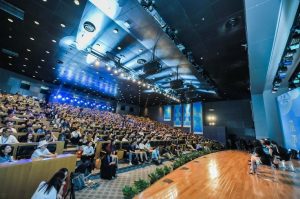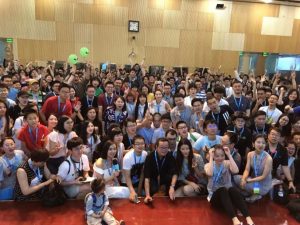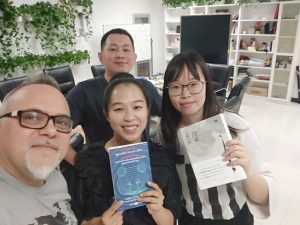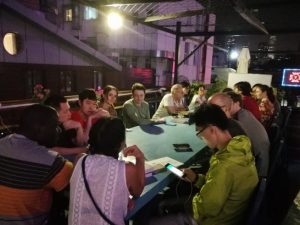Read in Italian here
People who know me know that for some years I have been involved in an almost impossible mission: to promote and spread not much the concept of SF “diversity” (a positive idea that hides, in my opinion, a fundamental error, that is diversity from a common standard; from a normality that has become a benchmark for evaluating any phenomenon, yet which doesn’t exist in reality) but instead a fairer distribution of “the future” and therefore of opportunities between dominant cultures and languages and those ones considered minor for the only reason of being “other”.
Fortunately, as a small publisher and SF writer, in five years of translations from at least six languages, and with a catalogue of over seventy stories published from around the world I can affirm:
Quality has no colour,
Quality has no nation,
Quality has no language,
Quality belongs to everyone.
So, the very fact of participating in the first Asia Pacific SF Convention, being myself Italian and therefore “alien” to the context, is an important step. Last year I was invited to the 4th International SF Convention in Chengdu (here’s the report on Samovar) organized by Science Fiction World, historical Chinese publishing house of SF books and magazines, while this time the invitation has arrived from Future Affairs Administration, a sign of widening of interest, even in the private sector, in this genre.
 Inside the wonderful venue of the Beijing Museum of Science and Technology, representatives from around the world contributed to two days of meetings, panels and debates on SF, while at the same time trying to build a network of relationships towards future international events that are not focused solely on English-speaking countries.
Inside the wonderful venue of the Beijing Museum of Science and Technology, representatives from around the world contributed to two days of meetings, panels and debates on SF, while at the same time trying to build a network of relationships towards future international events that are not focused solely on English-speaking countries.
The program was divided into three main sessions composed of various panels: one session was dedicated specifically to SF (Chinese cyberpunk, How to Survive Writing SF, What Makes a SF Writer, The Frontiers of Imagination), another on was on the SF industry (movies, videogames, web-series) and a third was linked to fandom and entertainment with cosplayer shows, V/R and A/R headset and book signings.
I couldn’t personally attend each panel, nor was I able to understand everything that was being said in those where the participants were all Chinese, but I managed to get an idea of the event, and here are some thoughts about the many positive points:
- Average age of participants: If in a typical European or American convention the majority of participants are between 40 and 60 years old, here they are all between 18 and 30, which is a guarantee of a positive future, if not a certainty of sure participation for many years to come. Anyone who wants to invest in this sector can be rest assured that fans will not disappear due to demographic reasons!
- Quality of the meetings: From “Big Liu”, aka Liu Cixin, superstar of the event with his 7 million books sold in China and 300,000 in the world of the Three-Body Problem, to Han Song, defined as the Chinese Kafka and winner of the Galaxy Award on the Saturday evening together with Chen Qiufan; to the Hugo and Nebula Award-winning Terry Bisson, the Canadian author Peter Watts, the veteran of Chinese SF Wang Jinkang, the chairwoman of many international conventions Crystal Huff, the fantasy writer Dean Francis Alfar, the recently published in China Canadian author Derek Kunsken, the visual effects expert Ben Hawker and many others, the panels have met with great success, leaving standing room only.
- Organization: If the 500-seat auditorium hosted the most important events, such as the panels on “The Future of the Imagination Industry”, “Women of the Future”, “International Cooperation in SF Film”, “A.I and Future Education”, and “Cities of Tomorrow”, in smaller classrooms, meetings on translation from various languages (among which I recall the speeches by Chiara Cigarini, Shaoyan Hu and Nikolai Karayev) have alternated with debates on the future of art, on SF for children and teenagers, on international cooperation, and on tomorrow’s food.
Another positive note was the gender balance. If in Europe and in the United States SF is (wrongly) perceived as a male phenomenon, things are very different in China, where women represent the overwhelming majority of those working in this genre and contributing to the fandom.
Obviously, this being the first convention organized by FAA, there were elements to improve, but I am sure that the group of people able to set up this fantastic event will make it even better in the future:
- Positioning of books: As an SF reader, writer and editor, I would have expected to find stack of books just outside the rooms where the panels were held. Instead, to my surprise, they had been placed outside the museum, in an exhibition area exposed to rain and dedicated to fans. The books stood apart, scattered among TV series gadgets, SF movies and cosplayer accessories. This seemed like a missed opportunity ...
- Translations: Where there were two or three foreign participants on panels, half of the time was lost to translation from English to Chinese. Perhaps it would have helped to invest in a real-time translation service or to make the panels less crowded with contributions.
But these are just two small issues, perhaps useful to improve something that is already excellent.
 Between one panel and another, I managed to deliver to Storycom editor Lisa Ding some copies of Sinosfera, the second contemporary Chinese SF anthology that I’ve just published on Future Fiction, with stories by Wang Jinkang, Han Song, Bao Shu, Fan Yilun and Fei Tang. Then, at the end of the second day, I exchanged a few words with the director of FAA, Xiaoting Ji – a young entrepreneur who, at about 30, after 10 years spent in Xinhua, the national press agency, opened a company to promote Chinese SF in both the literary, visual, and videogame sectors. Xiaoting Ji confirmed that APSFCon was a success, with over 2,000 tickets sold (which is never a sure thing at the first edition of a new event) and that the museum was impressed by the SF fans; so there’s a good chance of repeating the event next year!
Between one panel and another, I managed to deliver to Storycom editor Lisa Ding some copies of Sinosfera, the second contemporary Chinese SF anthology that I’ve just published on Future Fiction, with stories by Wang Jinkang, Han Song, Bao Shu, Fan Yilun and Fei Tang. Then, at the end of the second day, I exchanged a few words with the director of FAA, Xiaoting Ji – a young entrepreneur who, at about 30, after 10 years spent in Xinhua, the national press agency, opened a company to promote Chinese SF in both the literary, visual, and videogame sectors. Xiaoting Ji confirmed that APSFCon was a success, with over 2,000 tickets sold (which is never a sure thing at the first edition of a new event) and that the museum was impressed by the SF fans; so there’s a good chance of repeating the event next year!
Such work should not go unnoticed, and I have the feeling that other investors would like to participate in the growth of this phenomenon. The media coverage was worthy of a good festival of mainstream literature, which is important for our often ignored and mistreated genre.
Shenzhen: the Research Centre for Science and the Human Imagination
Being in China, I couldn’t miss the chance to pay a visit to Professor Wu Yan, who last year, after more than twenty years at Beijing Normal University, teaching SF and training an entire generation of authors and critics, decided to move to Shenzhen, in the south of the country, to open an incredible Research Center for Human Science and Imagination at the Southern University of Science and Technology. To understand the importance of Prof. Wu, one need to think that his students today represent the best writers of contemporary SF (the so-called balinghou generation, authors born in the ‘80s and ‘90s and made up by, among others, Chen Qiufan, Xia Jia, Bao Shu, Zhang Ran) as well as the critics and SF professors who teach in the universities of Chongqing (Zhang Fan), Beijing (Fei Dao), X’ian (Xia Jia), Shenzhen (Jiang Zhen Yu) and Shanghai (Yan Feng).
A man who dedicated his life to the promotion of SF, from schools to research centres, as well as having written as an author and critic himself, has my unconditional admiration.
The temperature in Shenzhen is hot, 35 degrees already in mid-May, a six-month-long blaze of fire that infests you every time you lose contact with an air conditioner. The city, or rather that urban entity grown in thirty years from 30 thousand inhabitants to over 17 million, unfolds seemingly without end among tropical vegetation cones, futuristic business centres and clusters of skyscrapers, as if it had emerged from a William Gibson novel: Neuromancer’s Tokyo is in comparison little more than a densely populated village.
During the ritual lunch, based on Cantonese cuisine, Prof. Wu introduces me to Mr. Li, the editor of Guangzhou Blue Ocean, with whom we have recently agreed to publish an international SF anthology, with stories taken from the Future Fiction catalogue in English. The first edition will consist of around 10,000 copies distributed in Chinese high schools and universities to show the students how creativity and imagination can combine with science and technology. I sign my second international contract as an editor, after the one with Bill Campbell’s Rosarium Publishing for a similar anthology in the USA, and afterwards we go and visit Frank Ma, a 'Business Angel' who created the “Science and Fantasy Growth Foundation” to help SF writers to focus on their stories without having to think about survival. The foundation was created in 2015 through the initiative of a group of scientists, writers and investors and since then it has distributed more than 1 million yuan (about 800,000 euros) to almost 50 authors, contributing to the publication of 7 novels. It also favoured the establishment of the Rising Star Award, which has collected more than 1000 participants and 1600 stories.
The Foundation HQ is at the top of a skyscraper overlooking the perennial transformation of Shenzhen. Frank Ma welcomes us by showing us his patents, among which is the floppy disk, and it is thanks to this that he can afford to finance projects such as the SF Growth Foundation.
Finally, after first meeting him at the WorldCon in Helsinki, I meet Professor Song Mingwei, another luminary of Chinese SF, who teaches at Wellesey College in Boston and who wrote the preface to Sinosfera. Together we record a video interview conducted by Zhang Ran, a very promising author whose story “Ether” I’ve published on Future Fiction.
The following day, Prof. Wu takes me on a tour of the Southern University of Science and Technology where 3000 students are currently studying. During the morning, I have the pleasure of making a presentation on Italian SF and some of my novels to Prof. Wu's class; around fifteen students, very young, curious, and enthusiastic. At their age, they are not afraid to ask, to show themselves naive, to make mistakes and to learn from mistakes.
Return to Beijing: Days of a Future Past
 I go back to the capital for an appointment with Storycom’s “Little Dragon”, the young and fierce Zhang Yiwen, and her editor Lisa Ding. It seems to me rather curious that at the head of companies such as Future Affairs Administration and Storycom there are two women in their early thirties, with projects on Chinese SF ranging from magazines publication, event organization and film production yet there are still those who believe that this genre is a “man’s business”.
I go back to the capital for an appointment with Storycom’s “Little Dragon”, the young and fierce Zhang Yiwen, and her editor Lisa Ding. It seems to me rather curious that at the head of companies such as Future Affairs Administration and Storycom there are two women in their early thirties, with projects on Chinese SF ranging from magazines publication, event organization and film production yet there are still those who believe that this genre is a “man’s business”.
Storycom in particular has supported the translation from Chinese into Italian of the anthologies Nebula and Sinosfera, so during the meeting we shared the results of the last months and discussed possible future collaborations. The smile of support of Zhang Yiwen – whose name in Chinese almost prophetically means “translation” – is the best hope to continue that I could receive.
 In the evening, I accept the invitation of Nancy Li to participate in the Beijing SF Reading Group in the wonderful location of the Bookworm Cafe. On the terrace of this literary bar they have mounted a screen and so I start talking about the “SF Engine” followed by a very participated discussion on my short story “The Green Ship” that has recently been published in Chinese by Future Affairs Administration.
In the evening, I accept the invitation of Nancy Li to participate in the Beijing SF Reading Group in the wonderful location of the Bookworm Cafe. On the terrace of this literary bar they have mounted a screen and so I start talking about the “SF Engine” followed by a very participated discussion on my short story “The Green Ship” that has recently been published in Chinese by Future Affairs Administration.
The meetings end here, and I would have just had one last day to spend as a tourist, together with Zhang Fan, an expert of Chinese SF and tireless reader, walking through the Summer Palace’s gardens, if I hadn't received a message at about 10 p.m from Xia Jia, perhaps one of the best contemporary Chinese SF authors. Within half an hour we are drinking a beer near the Lama Temple. We exchange books, hers in Chinese, mine in Italian, though neither of us will read them, at least not until they are translated, which is a rather difficult prospect in the short term.
We talk about the risk that many Chinese SF authors could be seduced by movies and stop writing fiction, preferring screenplays, which could mean that the entire balinghou generation, just born, could vanish, losing itself behind the lures of success and money of the big screen. It seems absurd but it’s really happening.
Finally, Xia Jia invites me for the next time I come to China to visit her in X’ian University for a meeting with her students. This year, she has been asked to prepare an SF course because the project of the New Silk Road – the high-speed train that will connect X’ian to Europe – is being defined, and needs imagination to be developed to its maximum potential. This is also Science Fiction, a piece of future in the middle of our present.
[…] Read in English […]
